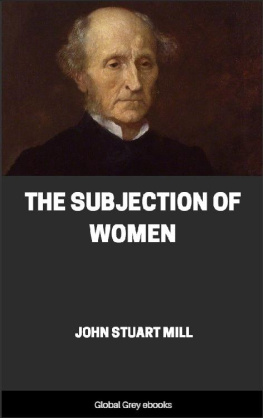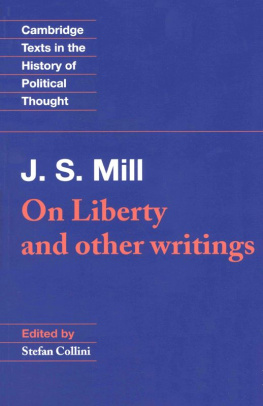John Stuart Mill - The Subjection of Women
Here you can read online John Stuart Mill - The Subjection of Women full text of the book (entire story) in english for free. Download pdf and epub, get meaning, cover and reviews about this ebook. year: 2018, publisher: Global Grey ebooks, genre: Science. Description of the work, (preface) as well as reviews are available. Best literature library LitArk.com created for fans of good reading and offers a wide selection of genres:
Romance novel
Science fiction
Adventure
Detective
Science
History
Home and family
Prose
Art
Politics
Computer
Non-fiction
Religion
Business
Children
Humor
Choose a favorite category and find really read worthwhile books. Enjoy immersion in the world of imagination, feel the emotions of the characters or learn something new for yourself, make an fascinating discovery.
- Book:The Subjection of Women
- Author:
- Publisher:Global Grey ebooks
- Genre:
- Year:2018
- Rating:4 / 5
- Favourites:Add to favourites
- Your mark:
- 80
- 1
- 2
- 3
- 4
- 5
The Subjection of Women: summary, description and annotation
We offer to read an annotation, description, summary or preface (depends on what the author of the book "The Subjection of Women" wrote himself). If you haven't found the necessary information about the book — write in the comments, we will try to find it.
The Subjection of Women — read online for free the complete book (whole text) full work
Below is the text of the book, divided by pages. System saving the place of the last page read, allows you to conveniently read the book "The Subjection of Women" online for free, without having to search again every time where you left off. Put a bookmark, and you can go to the page where you finished reading at any time.
Font size:
Interval:
Bookmark:
THE SUBJECTION OF WOMEN
BY
JOHN STUART MILL
1869
The Subjection of Women by John Stuart Mill.
This edition was created and published by Global Grey
GlobalGrey 2018

globalgreyebooks.com
The object of this Essay is to explain as clearly as I am able grounds of an opinion which I have held from the very earliest period when I had formed any opinions at all on social political matters, and which, instead of being weakened or modified, has been constantly growing stronger by the progress of reflection and the experience of life. That the principle which regulates the existing social relations between the two sexes the legal subordination of one sex to the other is wrong itself, and now one of the chief hindrances to human improvement; and that it ought to be replaced by a principle of perfect equality, admitting no power or privilege on the one side, nor disability on the other.
The very words necessary to express the task I have undertaken, show how arduous it is. But it would be a mistake to suppose that the difficulty of the case must lie in the insufficiency or obscurity of the grounds of reason on which my conviction rests. The difficulty is that which exists in all cases in which there is a mass of feeling to be contended against. So long as opinion is strongly rooted in the feelings, it gains rather than loses instability by having a preponderating weight of argument against it. For if it were accepted as a result of argument, the refutation of the argument might shake the solidity of the conviction; but when it rests solely on feeling, the worse it fares in argumentative contest, the more persuaded adherents are that their feeling must have some deeper ground, which the arguments do not reach; and while the feeling remains, it is always throwing up fresh intrenchments of argument to repair any breach made in the old. And there are so many causes tending to make the feelings connected with this subject the most intense and most deeply-rooted of those which gather round and protect old institutions and custom, that we need not wonder to find them as yet less undermined and loosened than any of the rest by the progress the great modern spiritual and social transition; nor suppose that the barbarisms to which men cling longest must be less barbarisms than those which they earlier shake off.
In every respect the burthen is hard on those who attack an almost universal opinion. They must be very fortunate well as unusually capable if they obtain a hearing at all. They have more difficulty in obtaining a trial, than any other litigants have in getting a verdict. If they do extort a hearing, they are subjected to a set of logical requirements totally different from those exacted from other people. In all other cases, burthen of proof is supposed to lie with the affirmative. If a person is charged with a murder, it rests with those who accuse him to give proof of his guilt, not with himself to prove his innocence. If there is a difference of opinion about the reality of an alleged historical event, in which the feelings of men general are not much interested, as the Siege of Troy example, those who maintain that the event took place expected to produce their proofs, before those who take the other side can be required to say anything; and at no time these required to do more than show that the evidence produced by the others is of no value. Again, in practical matters, the burthen of proof is supposed to be with those who are against liberty; who contend for any restriction or prohibition either any limitation of the general freedom of human action or any disqualification or disparity of privilege affecting one person or kind of persons, as compared with others. The a priori presumption is in favour of freedom and impartiality. It is held that there should be no restraint not required by I general good, and that the law should be no respecter of persons but should treat all alike, save where dissimilarity of treatment is required by positive reasons, either of justice or of policy. But of none of these rules of evidence will the benefit be allowed to those who maintain the opinion I profess. It is useless me to say that those who maintain the doctrine that men has a right to command and women are under an obligation obey, or that men are fit for government and women unfit, on the affirmative side of the question, and that they are bound to show positive evidence for the assertions, or submit to their rejection. It is equally unavailing for me to say that those who deny to women any freedom or privilege rightly allow to men, having the double presumption against them that they are opposing freedom and recommending partiality, must held to the strictest proof of their case, and unless their success be such as to exclude all doubt, the judgment ought to against them. These would be thought good pleas in any common case; but they will not be thought so in this instance. Before I could hope to make any impression, I should be expected not only to answer all that has ever been said by who take the other side of the question, but to imagine that could be said by them to find them in reasons, as I as answer all I find: and besides refuting all arguments for the affirmative, I shall be called upon for invincible positive arguments to prove a negative. And even if I could do all and leave the opposite party with a host of unanswered arguments against them, and not a single unrefuted one on side, I should be thought to have done little; for a cause supported on the one hand by universal usage, and on the other by so great a preponderance of popular sentiment, is supposed to have a presumption in its favour, superior to any conviction which an appeal to reason has power to produce in intellects but those of a high class.
I do not mention these difficulties to complain of them; first, use it would be useless; they are inseparable from having to contend through people's understandings against the hostility their feelings and practical tendencies: and truly the understandings of the majority of mankind would need to be much better cultivated than has ever yet been the case, before they be asked to place such reliance in their own power of estimating arguments, as to give up practical principles in which have been born and bred and which are the basis of much existing order of the world, at the first argumentative attack which they are not capable of logically resisting. I do not therefore quarrel with them for having too little faith in argument, but for having too much faith in custom and the general feeling. It is one of the characteristic prejudices of the ion of the nineteenth century against the eighteenth, to d to the unreasoning elements in human nature the infallibility which the eighteenth century is supposed to have ascribed to the reasoning elements. For the apotheosis of Reason we have substituted that of Instinct; and we call thing instinct which we find in ourselves and for which we cannot trace any rational foundation. This idolatry, infinitely more degrading than the other, and the most pernicious e false worships of the present day, of all of which it is the main support, will probably hold its ground until it way before a sound psychology laying bare the real root of much that is bowed down to as the intention of Nature and ordinance of God. As regards the present question, I am going to accept the unfavourable conditions which the prejudice assigns to me. I consent that established custom, and the general feelings, should be deemed conclusive against me, unless that custom and feeling from age to age can be shown to have owed their existence to other causes than their soundness, and to have derived their power from the worse rather than the better parts of human nature. I am willing that judgment should go against me, unless I can show that my judge has been tampered with. The concession is not so great as it might appear; for to prove this, is by far the easiest portion of my task.
Next pageFont size:
Interval:
Bookmark:
Similar books «The Subjection of Women»
Look at similar books to The Subjection of Women. We have selected literature similar in name and meaning in the hope of providing readers with more options to find new, interesting, not yet read works.
Discussion, reviews of the book The Subjection of Women and just readers' own opinions. Leave your comments, write what you think about the work, its meaning or the main characters. Specify what exactly you liked and what you didn't like, and why you think so.













